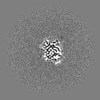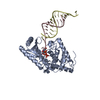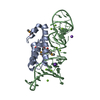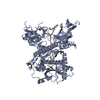+ Open data
Open data
- Basic information
Basic information
| Entry |  | |||||||||
|---|---|---|---|---|---|---|---|---|---|---|
| Title | Human Dis3L2 in complex with hairpinC-U12 | |||||||||
 Map data Map data | HsDis3L2 in complex with HairpinC-U12 | |||||||||
 Sample Sample |
| |||||||||
 Keywords Keywords | 3'-5' exonuclease / ds-RNA bound exonuclease / human exonuclease / RNA BINDING PROTEIN-RNA complex | |||||||||
| Function / homology |  Function and homology information Function and homology informationpolyuridylation-dependent mRNA catabolic process / miRNA catabolic process / mitotic sister chromatid separation / Z-decay: degradation of maternal mRNAs by zygotically expressed factors / poly(U) RNA binding / stem cell population maintenance / mRNA catabolic process / nuclear-transcribed mRNA catabolic process / RNA nuclease activity / P-body ...polyuridylation-dependent mRNA catabolic process / miRNA catabolic process / mitotic sister chromatid separation / Z-decay: degradation of maternal mRNAs by zygotically expressed factors / poly(U) RNA binding / stem cell population maintenance / mRNA catabolic process / nuclear-transcribed mRNA catabolic process / RNA nuclease activity / P-body / mitotic cell cycle / Hydrolases; Acting on ester bonds; Exoribonucleases producing 5'-phosphomonoesters / 3'-5'-RNA exonuclease activity / negative regulation of cell population proliferation / cell division / magnesium ion binding / cytoplasm Similarity search - Function | |||||||||
| Biological species |  Homo sapiens (human) / synthetic construct (others) Homo sapiens (human) / synthetic construct (others) | |||||||||
| Method | single particle reconstruction / cryo EM / Resolution: 3.1 Å | |||||||||
 Authors Authors | Meze K / Thomas DR / Joshua-Tor L | |||||||||
| Funding support |  United States, 2 items United States, 2 items
| |||||||||
 Citation Citation |  Journal: Nat Struct Mol Biol / Year: 2023 Journal: Nat Struct Mol Biol / Year: 2023Title: A shape-shifting nuclease unravels structured RNA. Authors: Katarina Meze / Armend Axhemi / Dennis R Thomas / Ahmet Doymaz / Leemor Joshua-Tor /  Abstract: RNA turnover pathways ensure appropriate gene expression levels by eliminating unwanted transcripts. Dis3-like 2 (Dis3L2) is a 3'-5' exoribonuclease that plays a critical role in human development. ...RNA turnover pathways ensure appropriate gene expression levels by eliminating unwanted transcripts. Dis3-like 2 (Dis3L2) is a 3'-5' exoribonuclease that plays a critical role in human development. Dis3L2 independently degrades structured substrates, including coding and noncoding 3' uridylated RNAs. While the basis for Dis3L2's substrate recognition has been well characterized, the mechanism of structured RNA degradation by this family of enzymes is unknown. We characterized the discrete steps of the degradation cycle by determining cryogenic electron microscopy structures representing snapshots along the RNA turnover pathway and measuring kinetic parameters for RNA processing. We discovered a dramatic conformational change that is triggered by double-stranded RNA (dsRNA), repositioning two cold shock domains by 70 Å. This movement exposes a trihelix linker region, which acts as a wedge to separate the two RNA strands. Furthermore, we show that the trihelix linker is critical for dsRNA, but not single-stranded RNA, degradation. These findings reveal the conformational plasticity of Dis3L2 and detail a mechanism of structured RNA degradation. | |||||||||
| History |
|
- Structure visualization
Structure visualization
| Supplemental images |
|---|
- Downloads & links
Downloads & links
-EMDB archive
| Map data |  emd_27829.map.gz emd_27829.map.gz | 97 MB |  EMDB map data format EMDB map data format | |
|---|---|---|---|---|
| Header (meta data) |  emd-27829-v30.xml emd-27829-v30.xml emd-27829.xml emd-27829.xml | 21.8 KB 21.8 KB | Display Display |  EMDB header EMDB header |
| Images |  emd_27829.png emd_27829.png | 44.9 KB | ||
| Filedesc metadata |  emd-27829.cif.gz emd-27829.cif.gz | 7 KB | ||
| Others |  emd_27829_half_map_1.map.gz emd_27829_half_map_1.map.gz emd_27829_half_map_2.map.gz emd_27829_half_map_2.map.gz | 95.5 MB 95.5 MB | ||
| Archive directory |  http://ftp.pdbj.org/pub/emdb/structures/EMD-27829 http://ftp.pdbj.org/pub/emdb/structures/EMD-27829 ftp://ftp.pdbj.org/pub/emdb/structures/EMD-27829 ftp://ftp.pdbj.org/pub/emdb/structures/EMD-27829 | HTTPS FTP |
-Related structure data
| Related structure data |  8e29MC  8e27C  8e28C  8e2aC M: atomic model generated by this map C: citing same article ( |
|---|---|
| Similar structure data | Similarity search - Function & homology  F&H Search F&H Search |
- Links
Links
| EMDB pages |  EMDB (EBI/PDBe) / EMDB (EBI/PDBe) /  EMDataResource EMDataResource |
|---|
- Map
Map
| File |  Download / File: emd_27829.map.gz / Format: CCP4 / Size: 103 MB / Type: IMAGE STORED AS FLOATING POINT NUMBER (4 BYTES) Download / File: emd_27829.map.gz / Format: CCP4 / Size: 103 MB / Type: IMAGE STORED AS FLOATING POINT NUMBER (4 BYTES) | ||||||||||||||||||||||||||||||||||||
|---|---|---|---|---|---|---|---|---|---|---|---|---|---|---|---|---|---|---|---|---|---|---|---|---|---|---|---|---|---|---|---|---|---|---|---|---|---|
| Annotation | HsDis3L2 in complex with HairpinC-U12 | ||||||||||||||||||||||||||||||||||||
| Projections & slices | Image control
Images are generated by Spider. | ||||||||||||||||||||||||||||||||||||
| Voxel size | X=Y=Z: 0.67 Å | ||||||||||||||||||||||||||||||||||||
| Density |
| ||||||||||||||||||||||||||||||||||||
| Symmetry | Space group: 1 | ||||||||||||||||||||||||||||||||||||
| Details | EMDB XML:
|
-Supplemental data
-Half map: Half map B HsDis3L2 in complex with HairpinC-U12
| File | emd_27829_half_map_1.map | ||||||||||||
|---|---|---|---|---|---|---|---|---|---|---|---|---|---|
| Annotation | Half map B HsDis3L2 in complex with HairpinC-U12 | ||||||||||||
| Projections & Slices |
| ||||||||||||
| Density Histograms |
-Half map: Half map A HsDis3L2 in complex with HairpinC-U12
| File | emd_27829_half_map_2.map | ||||||||||||
|---|---|---|---|---|---|---|---|---|---|---|---|---|---|
| Annotation | Half map A HsDis3L2 in complex with HairpinC-U12 | ||||||||||||
| Projections & Slices |
| ||||||||||||
| Density Histograms |
- Sample components
Sample components
-Entire : Wild-type HsDis3L2 in complex with hairpinC-U12
| Entire | Name: Wild-type HsDis3L2 in complex with hairpinC-U12 |
|---|---|
| Components |
|
-Supramolecule #1: Wild-type HsDis3L2 in complex with hairpinC-U12
| Supramolecule | Name: Wild-type HsDis3L2 in complex with hairpinC-U12 / type: complex / ID: 1 / Parent: 0 / Macromolecule list: all |
|---|---|
| Source (natural) | Organism:  Homo sapiens (human) Homo sapiens (human) |
| Molecular weight | Theoretical: 100 KDa |
-Macromolecule #1: DIS3-like exonuclease 2
| Macromolecule | Name: DIS3-like exonuclease 2 / type: protein_or_peptide / ID: 1 / Number of copies: 1 / Enantiomer: LEVO EC number: Hydrolases; Acting on ester bonds; Exoribonucleases producing 5'-phosphomonoesters |
|---|---|
| Source (natural) | Organism:  Homo sapiens (human) Homo sapiens (human) |
| Molecular weight | Theoretical: 99.414195 KDa |
| Recombinant expression | Organism:  |
| Sequence | String: MSHPDYRMNL RPLGTPRGVS AVAGPHDIGA SPGDKKSKNR STRGKKKSIF ETYMSKEDVS EGLKRGTLIQ GVLRINPKKF HEAFIPSPD GDRDIFIDGV VARNRALNGD LVVVKLLPEE HWKVVKPESN DKETEAAYES DIPEELCGHH LPQQSLKSYN D SPDVIVEA ...String: MSHPDYRMNL RPLGTPRGVS AVAGPHDIGA SPGDKKSKNR STRGKKKSIF ETYMSKEDVS EGLKRGTLIQ GVLRINPKKF HEAFIPSPD GDRDIFIDGV VARNRALNGD LVVVKLLPEE HWKVVKPESN DKETEAAYES DIPEELCGHH LPQQSLKSYN D SPDVIVEA QFDGSDSEDG HGITQNVLVD GVKKLSVCVS EKGREDGDAP VTKDETTCIS QDTRALSEKS LQRSAKVVYI LE KKHSRAA TGFLKLLADK NSELFRKYAL FSPSDHRVPR IYVPLKDCPQ DFVARPKDYA NTLFICRIVD WKEDCNFALG QLA KSLGQA GEIEPETEGI LTEYGVDFSD FSSEVLECLP QGLPWTIPPE EFSKRRDLRK DCIFTIDPST ARDLDDALSC KPLA DGNFK VGVHIADVSY FVPEGSDLDK VAAERATSVY LVQKVVPMLP RLLCEELCSL NPMSDKLTFS VIWTLTPEGK ILDEW FGRT IIRSCTKLSY EHAQSMIESP TEKIPAKELP PISPEHSSEE VHQAVLNLHG IAKQLRQQRF VDGALRLDQL KLAFTL DHE TGLPQGCHIY EYRESNKLVE EFMLLANMAV AHKIHRAFPE QALLRRHPPP QTRMLSDLVE FCDQMGLPVD FSSAGAL NK SLTQTFGDDK YSLARKEVLT NMCSRPMQMA LYFCSGLLQD PAQFRHYALN VPLYTHFTSP IRRFADVLVH RLLAAALG Y RERLDMAPDT LQKQADHCND RRMASKRVQE LSTSLFFAVL VKESGPLESE AMVMGILKQA FDVLVLRYGV QKRIYCNAL ALRSHHFQKV GKKPELTLVW EPEDMEQEPA QQVITIFSLV EVVLQAESTA LKYSAILKRP GTQGHLGPEK EEEESDGEPE DSSTS UniProtKB: DIS3-like exonuclease 2 |
-Macromolecule #2: RNA hairpin C-U12
| Macromolecule | Name: RNA hairpin C-U12 / type: rna / ID: 2 / Number of copies: 1 |
|---|---|
| Source (natural) | Organism: synthetic construct (others) |
| Molecular weight | Theoretical: 10.386 KDa |
| Sequence | String: UCGGCGCCUU UCGAGGCGCC GUUUUUUUUU UUU |
-Experimental details
-Structure determination
| Method | cryo EM |
|---|---|
 Processing Processing | single particle reconstruction |
| Aggregation state | particle |
- Sample preparation
Sample preparation
| Concentration | 0.3 mg/mL | ||||||||||||
|---|---|---|---|---|---|---|---|---|---|---|---|---|---|
| Buffer | pH: 7.5 Component:
| ||||||||||||
| Grid | Model: UltrAuFoil R1.2/1.3 / Material: GOLD / Support film - Material: GOLD / Support film - topology: HOLEY ARRAY / Pretreatment - Type: GLOW DISCHARGE / Pretreatment - Time: 30 sec. / Pretreatment - Atmosphere: AIR / Pretreatment - Pressure: 0.042 kPa | ||||||||||||
| Vitrification | Cryogen name: ETHANE / Chamber humidity: 90 % / Chamber temperature: 295 K / Instrument: FEI VITROBOT MARK IV |
- Electron microscopy
Electron microscopy
| Microscope | FEI TITAN KRIOS |
|---|---|
| Temperature | Min: 80.0 K / Max: 80.0 K |
| Image recording | Film or detector model: GATAN K3 BIOQUANTUM (6k x 4k) / Detector mode: COUNTING / Digitization - Dimensions - Width: 5760 pixel / Digitization - Dimensions - Height: 4092 pixel / Digitization - Frames/image: 1-30 / Number grids imaged: 1 / Number real images: 4761 / Average electron dose: 62.4 e/Å2 |
| Electron beam | Acceleration voltage: 300 kV / Electron source:  FIELD EMISSION GUN FIELD EMISSION GUN |
| Electron optics | C2 aperture diameter: 70.0 µm / Calibrated defocus max: 2.8000000000000003 µm / Calibrated defocus min: 0.5 µm / Illumination mode: FLOOD BEAM / Imaging mode: BRIGHT FIELD / Cs: 2.7 mm / Nominal defocus max: 2.6 µm / Nominal defocus min: 0.7000000000000001 µm / Nominal magnification: 130000 |
| Sample stage | Specimen holder model: FEI TITAN KRIOS AUTOGRID HOLDER / Cooling holder cryogen: NITROGEN |
| Experimental equipment |  Model: Titan Krios / Image courtesy: FEI Company |
+ Image processing
Image processing
-Atomic model buiding 1
| Initial model |
| ||||||||||
|---|---|---|---|---|---|---|---|---|---|---|---|
| Details | The model of Homo Sapiens Dis3L2 was used as a starting reference for the protein and the nucleic acid was used from PDB 4PMW. All manual building was done in Coot. The hairpin of the RNA was built by using the dsRNA from PDB 5W0O as a template. The nucleotides were mutated to the sequence of hairpinC-U12. To guide the building of the tetraloop, PDB 1F7Y was used to guide the introduction of restraints in the UUCG tetraloop. All model refinements were done in PHENIX. | ||||||||||
| Refinement | Space: REAL / Protocol: FLEXIBLE FIT | ||||||||||
| Output model |  PDB-8e29: |
 Movie
Movie Controller
Controller



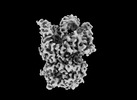




 Z (Sec.)
Z (Sec.) Y (Row.)
Y (Row.) X (Col.)
X (Col.)







